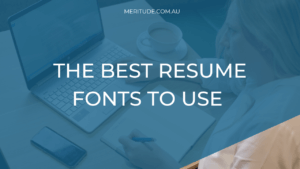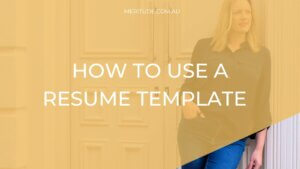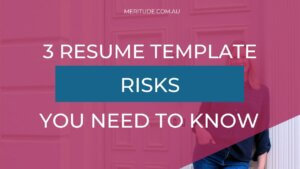So, you’ve decided it’s time to apply for a new job. Excellent!
Time to dust off that old resume…..
Whether it’s been 10 months or 10 years since you applied for a position, resumes and the application processes change frequently.
What you thought was right and landed you interviews the last time could very well hinder your job search efforts this time.
If you really want to know HOW to get your application read in today’s market then you’re in the right place. Below is up to date information on what to include on a resume to ensure it not only passes through Applicant Tracking Systems but that a human can read it, understand it and quickly identify if you align to the position on offer.
What To Include On A Resume
Personal Details
The days are gone where you need to include date of birth, marital status, visa details, etc (yes, I still see these on resumes). Your application will show within seconds how outdated you are and not across current recruitment practices if you do this.
What you need is:
- Contact details
- A professional email address
- Direct link to your LinkedIn profile
Speaking of LinkedIn profiles. When adding in your LinkedIn URL to your resume make sure you’ve customised it so it doesn’t include a batch of random numbers at the end. If you don’t know how to do this read LinkedIn’s article Customizing Your Public Profile URL.
Career Objectives
I have previously written about career objectives, you can read more here: Career Objectives Are Dead, however, I’ll restate my point – kicking off your resume with your career or personal objective or ambition is a No No! Instead, include a concise professional summary at the top of your resume.
Education
Unless you are a recent graduate your education belongs at the bottom of your resume. Even with recent graduates, there are techniques now used in resume writing where your education can live at the bottom of your resume with the top part being used to sell you instead.
Make sure you include your most recent education and eliminate unnecessary qualifications/professional development courses, expired licences/certificates etc.
Key Skills
If you are going to include your key skills (and I recommend you do on page 1) then they should be industry terms targeted to the position you are applying. Do not include wordy sentences and paragraphs about how great your time management skills are.
Experience
Many job seekers fall down in this area when preparing their resume. Generally, I’ve found that people get the order right, in that your most recent employment belongs at the top of your experience section. But that’s where it stops. Every day I see resumes where people have copy and pasted their entire job description for each role. It’s one of the worst things you can do.
Here’s what you’re aiming for:
- A quick scope point to summarise your role
- Up to 5 key responsibilities under your positions
- 3 key achievements under each job (where possible)
Not everyone will have achievements, but you should be making an effort to highlight how you contributed to a company other than just doing your job.
Formatting
If you want your resume to be read by Applicant Tracking Systems, you need a standard word document with simple formatting. The following should be avoided:
- Graphically designed resumes
- Photos
- Text that is formatted in a text box in MS Word
- Graphics and fancy fonts
Applicant Tracking Systems aside, Recruiters and Hiring Managers do not like seeing your photo on a resume. Only include this if specifically asked in the job ad (it’s rare but sometimes employers ask) or you are applying for an Acting/Modelling gig.
Finally, your resume should be no more than 3 pages (maximum).
References
References are no longer required on a resume. They will be asked for these at some point during the interview process and it’s better not to offer up references until you know what the role is about.
If like me, you have multiple people you use for references—you’ll want to know about the role first so you can provide the references that are most appropriate for the position you are applying.
Only add references to your resume if asked for in the job advertisement.
Multiple Resumes
It’s important to constantly update your resume but many job seekers don’t realise they need multiple resumes. Often people have diverse backgrounds and they want to apply for multiple roles (ie: Administration, Customer Service and Retail).
Keywords, content and responsibilities need to change on a resume depending on the role you’re applying for. Therefore you may need multiple resumes that are tailored and targeted to different positions.
Case in point: If you are applying for a Human Resources Manager position and the job ad uses the term HR Manager, then the reader wants to see that keyword in your resume. They are looking for job titles, experience and keywords all related to the advertised role of a Human Resource Manager.
Don’t be attached to your background. In today’s job market, it’s NOT about including everything and the kitchen sink on your resume. It’s about providing the key information the reader needs to know.
If you’re unsure about;
- Strategizing your resume correctly for the position you seek
- Showcasing your experience and accomplishments
- Relevant keywords to include
- Or anything else which could limit your job search…
That’s what a professional resume writer can help you with. If you’re unsure about whether to take the leap and have your resume written I wrote a post dedicated to the subject – When Should You Hire a Resume Writer.
But if you’re tired of seeing lacklustre results from your applications and are ready to fire up your job search – Why wait? Begin the end of your job search today!





